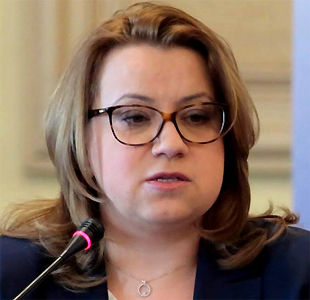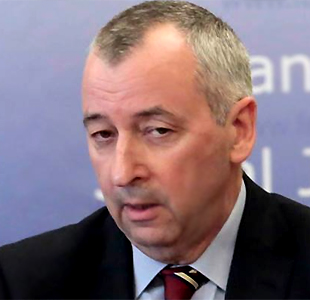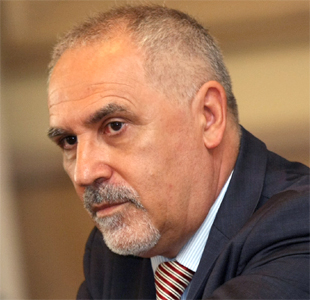The draft of the national programme for the Council of EU’s Bulgarian presidency should be ready by June. That was reported by Vice Premier Denitsa Zlateva at a conference in Sofia, organized by the Friedrich Ebert Foundation, the Bulgarian Diplomatic Society and the Economics and International Relations Institute. The final version of the document will be ready on the eve of the presidency itself which starts as of January next year. The Black Sea region is one of the major subjects for Bulgaria.
 The Black Sea region is the focal point of the interests of the EU, NATO and Russia. This is more than enough for greater attention to be paid to it. This part of Europe has always attracted the geopolitical interest of the great powers and after the 2007 EU accession of Bulgaria and Romania the economic interest grew up rapidly as well. Caretaker Vice Premier Denitsa Zlateva who is in charge of this country’s initial presidency of the Council, tackled the significance of the Black sea region for the EU.
The Black Sea region is the focal point of the interests of the EU, NATO and Russia. This is more than enough for greater attention to be paid to it. This part of Europe has always attracted the geopolitical interest of the great powers and after the 2007 EU accession of Bulgaria and Romania the economic interest grew up rapidly as well. Caretaker Vice Premier Denitsa Zlateva who is in charge of this country’s initial presidency of the Council, tackled the significance of the Black sea region for the EU.
“The strategic importance of the Black Sea region for the EU is not a secret to anyone and that was recognized with the 2007 accession of both countries. Thus the Black Sea turned partially into an internal for the union sea”, Minister Zlateva points out.
 That fact was confirmed by Georgi Pirinski, former foreign minister of Bulgaria and today an MEP. In his words the EU has been discussing a common defense policy more and more intensely. The diplomat thinks this is necessary but only unilaterally, alongside the NATO plan for increasing of defense budget expenses and relies on diplomacy at the solving of regional issues:
That fact was confirmed by Georgi Pirinski, former foreign minister of Bulgaria and today an MEP. In his words the EU has been discussing a common defense policy more and more intensely. The diplomat thinks this is necessary but only unilaterally, alongside the NATO plan for increasing of defense budget expenses and relies on diplomacy at the solving of regional issues:
“There are enough prerequisites across the Black Sea region which could serve as basis for the development of diplomatic initiatives that can get control over the increasing tension and confrontation. I am convinced that placing the Black Sea region on the EU agenda during the Bulgarian presidency will be transferred through the Austrian to the Romanian presidency in early 2019 – because the topic is more than live and it is really necessary to tackle it right now.”
 The Black Sea region has always been a focal point of contiguity at different levels, says Lyubomir Kyuchukov, head of the Economics and International Relations Institute in Sofia. In his words the discussion rarely steps out of the ‘looking for the one to blame’ format at the solving of conflicts. He adds more on what’s typical for the region:
The Black Sea region has always been a focal point of contiguity at different levels, says Lyubomir Kyuchukov, head of the Economics and International Relations Institute in Sofia. In his words the discussion rarely steps out of the ‘looking for the one to blame’ format at the solving of conflicts. He adds more on what’s typical for the region:
“Many bilateral frozen conflicts, many areas of real military actions, lots of arms and above all – a direct line of confrontation of the Cold War type… Unlike the direct neighbors of Russia, Bulgaria and most South-East European countries see the risks for their security not that much in a direct Russian invasion, but more like in the totally worsened security environment due to the Russia – NATO confrontation. This makes the regional states more vulnerable to direct security threats, such as terrorism, radical Islam, the inflow of instability from the Middle East and the refugee pressure.”
According to Lyubomir Kyuchukov, Russia doesn’t have the potential to offer an alternative of the EU to the SEE countries. He also recommends to the current European leaders that it is always better to negotiate with Russia than to be in a war with it, as history shows.
English version: Zhivko Stanchev
Completely calm and normal, according to the law, the election day is taking place in the only open polling station in Kuwait. The Bulgarian community in the Arab country numbers about 300-350 people , mostly highly educated specialists in the fields..
"The last one to quit wins. If we believe and want democracy in Bulgaria to win..., we must persevere, even though it's discouraging," Izabela Shopova from Brisbane, Australia tells Radio Bulgaria Nearly 6,000 people identified themselves as..
On the threshold of the sixth early parliamentary elections in less than three years, the fatigue of the Bulgarian citizens from the administrative hopelessness is visible . This seems to be the case in the political arena as well - proof is the..
The support for the nomination of Atanas Atanasov for National Assembly Speaker is linked to support for Boyko Borissov as a candidate for prime..

+359 2 9336 661
